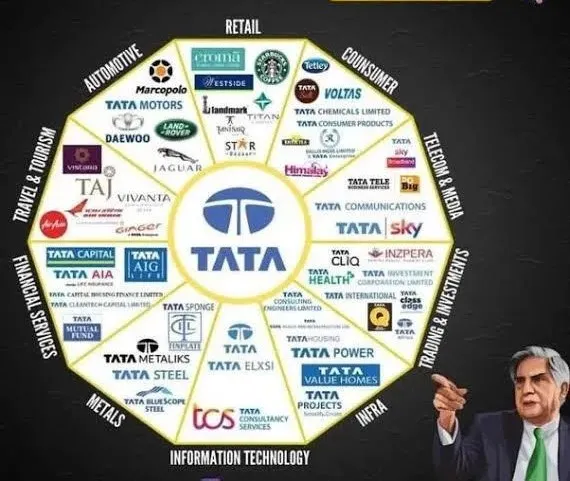Tata Group is an Indian conglomerate comprising 30 companies across diverse sectors, including automobiles, chemicals, consumer products, energy, engineering, financial services, information technology, materials, and telecommunications. Established in 1868, it operates in over 100 countries on six continents and has been a significant player in the Indian industry since the early 20th century. The group initially prospered through raw material trade in the late 19th century and expanded into textile manufacturing, iron and steel, and hydroelectric power. Over time, Tata Group ventured into chemicals, aviation, automobiles, and information technology, reflecting the growth of the global economy and Indian capitalism.

Diverse Portfolio
Tata Group boasts an impressive portfolio of companies, each excelling in its field:
- Tata Steel: A leading global steel manufacturer with an annual crude steel capacity of 35 million tons.
- Tata Motors: Produces a wide range of vehicles, including cars, trucks, buses, and utility vehicles.
- Tata Consultancy Services (TCS): Provides IT services, consulting, and business solutions, currently ranking as the second-largest company in India by market capitalization as of 2024.
- Tata Chemicals: Engaged in chemicals, crop protection, and specialty products.
- Tata Consumer Products: A major player in the tea and coffee industry, recognized as one of the world’s largest manufacturers and distributors of tea.
- Tata Power: India’s largest power company as of 2024.
- Titan: A leader in the lifestyle industry, offering products such as jewellery, watches, and eyewear.
- Tata Capital: Provides comprehensive financial services, including wealth management and infrastructure finance.
- Indian Hotels Company: India’s largest hospitality company, with numerous hotels across 12 countries and four continents as of 2024.
- Indian Advanced Systems Limited: Specialises in aerospace and defence technology.
- Tata Communications: A key telecommunications provider in India.
Historical Growth
1868–1932: Foundational Years
Founded by Jamsetji Nusserwanji Tata, the Tata Group began as a trading firm in 1868. Following his father’s successful trading ventures, Jamsetji identified key market trends, leading to significant profits in opium and cotton trades. The establishment of the Indian Hotels Company in 1902 marked Tata’s foray into luxury hospitality with the launch of the Taj Mahal Palace & Tower. After Jamsetji’s passing in 1904, his son Sir Dorabji Tata took the helm, overseeing the group’s diversification into industries such as steel, electricity, and consumer goods.
1932–1991: Expansion Era
Under the leadership of Sir Nowroji Saklatwala and later J.R.D. Tata, Tata Group became synonymous with India’s economic growth. J.R.D. Tata expanded the company into chemicals, technology, and aviation, gaining international acclaim. The establishment of Tata Engineering and Locomotive Company (later Tata Motors) in 1945 marked a significant milestone in its engineering endeavours.
1992–2022: Global Ventures
Ratan Tata assumed leadership in 1991, steering the group toward globalisation. Key acquisitions included Tetley Tea in 2000 and Daewoo Motors in 2004. The landmark acquisition of Corus Group by Tata Steel in 2007 solidified its position in the global steel market. In 2008, Tata Motors launched the Nano, the “People’s Car,” aimed at providing affordable transportation. After Ratan’s retirement in 2012 and a brief return in 2016, Natarajan Chandrasekaran became the new chairman in 2017. The acquisition of Air India in 2022 marked a notable return to the airline industry.

Legacy and Philanthropy
Tata Group has significantly contributed to India’s economic modernization, earning accolades and recognition for its role in shaping the nation’s industrial landscape. Jamsetji Tata was hailed by India’s first Prime Minister, Jawaharlal Nehru, as a visionary leader. The Tata family has also made substantial philanthropic contributions, establishing institutions like the Indian Institute of Science and Tata Memorial Hospital.
Despite its successes, Tata Group has faced criticism for its extensive influence on Indian society and its suppression of labour movements. Activist Arundhati Roy highlighted the group’s pervasive presence in everyday life, underscoring the dependence of many Indians on Tata products and services.
Cultural Significance
The phrase “Kisis ka namak khana,” meaning “to eat someone’s salt,” signifies a deep-rooted cultural connection and dependence on someone. Tata Group has embraced this concept in its advertising, showcasing its loyalty to India. In contrast, critiques emphasise the pervasive influence of Tata, illustrating the intricate relationship between the conglomerate and the Indian populace.
Tata Group’s journey from a trading firm to a global powerhouse exemplifies the evolution of Indian industry. With its diverse portfolio and commitment to philanthropy, Tata Group continues to play a pivotal role in shaping India’s economic landscape and societal development.
